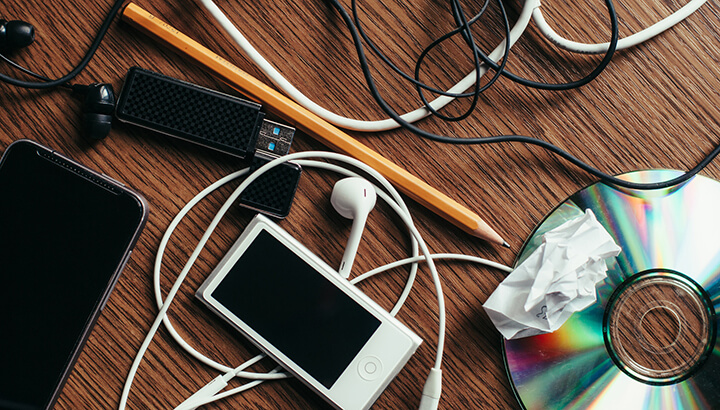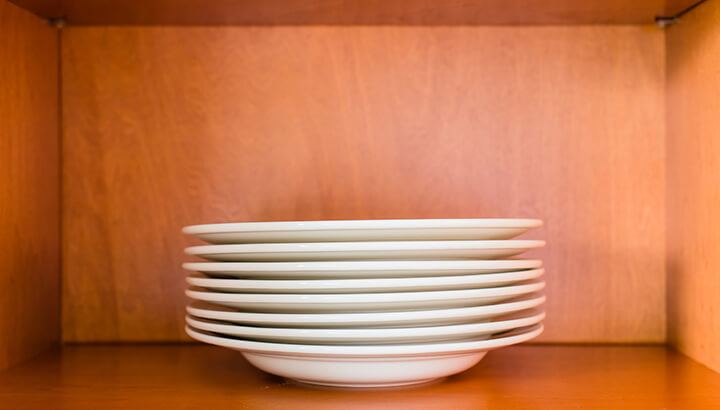
Growing up, my mom always said, “tidy house, tidy mind.” Of course, back then, I just disregarded the true meaning of those words. But now that I’m an adult, with a house of my own? Yep, I get it, mom.
Being a writer and a small business owner, I need a tidy, clean space or else I would never be able to collect my thoughts. If you’re in a cluttered space and have a cluttered mind, you bet your productivity levels will dip. How is it that clutter happens and what can you do about it?
How clutter influences your mind
You may think, how can inanimate objects influence my brain? More importantly, how does all that stuff get there in the first place?
Let’s be honest here, everyone has areas in their house that are packed with stuff. Maybe it’s your linen closet, cupboards, garage or basement. Over the years, we collect things because, unfortunately, we live in a world where consumerism reigns supreme. We often purchase things and hang onto them, even if we do not use them for years — but why?
Interestingly, researchers have found that we can experience a degree of “pain” when giving up a possession. This is especially apparent among those with hoarding disorder. A study found that when individuals suffering from this condition let go of an item, the two areas that are associated with pain lit up in the brain.
If you’re thinking, well, I’m not a hoarder, my answer to you is, you don’t need to be. This is why large companies like Apple have all their products on display. By simply touching an item, you can build an emotional attachment to it. This effect was documented in a study published in Judgement and Decision Making.
Exclusive: How Clutter Can Destroy Your Health — Get Organized Today
Mess equals stress

As “stuff” piles up in your house or work environment, this can negatively influence your ability to process information and focus. At the end of the day, mess equals stress. If your work or living space is cluttered, you can significantly inhibit your level of creativity and productivity.
This has been documented throughout research, including a key study published in the Journal of Neuroscience. As explained by the researchers, when we have multiple stimuli in our visual field at the same time, it limits the processing capability of our visual system. Researchers concluded that a cluttered environment will restrict your ability to focus.
The same is true regarding stress. A number of studies have shown that physical chaos contributes to increased levels of cortisol. Within another study, 32 families were examined. Researchers found that women who had a high density of household objects also exhibited higher cortisol levels. This project was actually turned into a book, focusing on consumerism and contemporary culture.
Even more interesting, a cluttered, chaotic space can actually make us overeat. Within one study, researchers observed 100 females. Some of these women were placed in a standard kitchen, whereas others were placed in a chaotic kitchen condition. Researchers found that those in the cluttered kitchen ate more of the unhealthy food choices offered. They concluded that this type of environment can make us more vulnerable.
We can all relate — so, what do you do about it?
It’s time to declutter
If you can relate, you know that a cluttered, messy space can make you anxious and reduce your ability to concentrate. So what do you do about it? How can you declutter your surroundings to declutter your mind? In order to clear your mind and reduce feelings of stress, try these practical solutions.
1. Work as a team to organize

If it is your home that is in need of a good clean, involve the entire family — after all, the clutter is more than likely a combination of your belongings. Start in one room. Do not move into the next area until that space is completely organized. If you’re on your own, same rules apply.
Lay out four bins so that you have a place to put your stuff. The first bin will be for items you want to keep, the second will be for items you can donate, the third will be recycling, and as a last resort, the fourth will be garbage. Once you have organized your stuff into these categories, follow through!
Take the donation items immediately to your local drop-off center. Put the recycling and garbage in your garage and then find a home for the items you’re keeping. Learn to let go of the things you no longer use or need — a family in need will happily take them off your hands. If you have a selection of items that are in good shape, you can also host a neighborhood yard sale.
2. Form new habits
In my home office, I have a place for everything. This is something that I never used to bother with, but before I knew it, my office was a disaster. I couldn’t work in that environment — I was too distracted all the time. Now, I have baskets and bins for designated items. I’ve gotten into a new routine: after I am done with an item, it immediately goes back into its rightful place.
This sounds simple, but it will actually take time, effort and commitment. You need to consciously be aware of the things you use and the importance of organization. Like any new habit, whether it’s a new exercise routine or cleaning regimen, you need to start small. There’s no point in overwhelming yourself.
Today, start with one singular goal and block out all the other mental noise. If you want to clean out your closet, go for it. Don’t worry about the mess under your deck or in the spare bedroom yet. Focus on cleaning your closet. Once that’s achieved, move onto the next task. Finish one before starting another and before you know it, you will have created positive momentum.
3. Move away from physical objects

Remember, clutter doesn’t just involve physical items — clutter comes in many forms. For example, my computer often needs to be reorganized, as old, outdated files have to be removed while all other important documents are loaded onto a hard drive and sorted.
For you, your mind may feel cluttered due to a neverending to-do list. In this sense, you need to approach this “chaos” just as you would physical items. Make a list of what needs to be done and then prioritize. Complete the most important tasks or the items that are weighing heavily on your mind.
Scheduling can make a significant difference for those who feel as though they are always busy, yet not accomplishing much. Instead of storing everything in your brain, write it down. What is it that you’re worried about? What plan of action can help you achieve important goals? Are there relationships that are draining your energy?
At the end of the day, you can make space in your mind, you just need to remain organized and learn to let go. Far too often, our mind is cluttered with things from the past. If this sounds like you, it’s time to move on and discard those thoughts and feelings that are impeding on your present life.
4. Learn to meditate
Now, I’m not suggesting that you meditate on top of all your stuff — but if you begin to practice meditation, you’ll soon find that you are more focused and, in turn, more motivated. This can help you regarding all of the tips listed above, especially in terms of focusing on the present moment.
Stress and clutter create a vicious cycle. But if you target one, then you will essentially target the other. As you declutter your space, stress levels will reduce. By reducing stress, you will be more inclined to continually organize both your physical environment and mental storage.
It makes sense that meditation would help during a time when you’re aiming to clear out clutter, as practitioners of Buddhism often claim that a person’s external environment is a mirror of their inner being, as well as their state of mind. As you learn to let go of physical items and mentally taxing thoughts, you begin to feel more like yourself again.
When you practice meditation, you will benefit from a more calm and non-judgemental mind. As you’d expect, this will help when you need to remove clutter. Instead of getting frustrated and upset, you will be able to focus on the present task at hand, increase your level of insight regarding new habits and see how this mess can be avoided in the future.
Take daily action
Keep these tips in mind today and every day. Remember, spring cleaning shouldn’t be a once a year activity. In order to thrive in a positive environment, you’ll need to first recognize the connection between clutter and stress — then take daily action.
No more excuses. You can achieve a clearer, more stable mind starting today. Right now, get up and go clean out one drawer. Once you see how lovely and organized it looks, you’ll be motivated to continue. Keep this cycle going until all of your tasks have been completed.
It may take weeks, it may take months. But as long as you’re making continual progress, that’s all that matters. Allow yourself to live in a clean, comfortable space. Take back your home, office and mind. Declutter today!
— Krista Hillis

